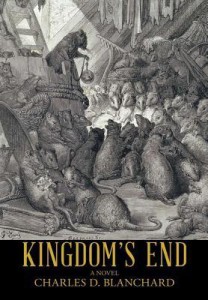★★★★
Anthropomorphizing animals in literature is a long and proud tradition, ranging from Watership Down and Animal Farm to the Redwall novels of Brian Jacques, and many others. That being said, it is also very difficult to create an engaging novel based purely on the perspective of animals, and most attempts at this are relegated to the realm of children’s books. In Kingdom’s End, however, the second novel from Charles Blanchard, readers are given an intimate look at the complex social hierarchy, unique philosophy and variable personalities within a veritable kingdom of rats.
Using a population of animals that most people despise makes this an instantly intriguing read, and the plot is rich with detailed descriptions of the “rat life.” Human beings understand the rat race better than most species, and there are plenty of tongue-in-cheek passages about rodent mentality that seem eerily applicable to us. In the Crown Jewel, a 1500-seat movie theatre, Indio the blind mole rat has ruled for more than 30 years, but Matthias, a young Norway rat with a reputation as a fierce soldier, believes that the reign of Indio should end. Thus begins the sweeping tale of this festering colony, with rats fighting on all sides, against encroaching outside forces and internal conflicts, all while balancing on a precious, unstable infrastructure. If a better allegory for the United States has been written in the past decade, that comes as news to this reviewer.
Like all books that rely on animals as the main characters, there are many subtle parallels to human foibles and failings, in addition to the delicate nature of human societies. In certain corners of the world, ruling over a pile of trash is closer to reality than one might imagine, and the same backstabbing, deceitful and self-serving interests seen in this novel are abundantly present in our more “evolved” species. However, lecturing human beings on their folly is much more palatable from an anthropomorphized angle, and while the morals and lessons hopefully sink in, readers do tend to enjoy a mirror being held up to their failures in a slightly subtle way, and the book excels on that front.
The inclusion of human characters and their backstories and internal narration is an interesting choice, and one that feels somewhat out of place at times. While it gives a grander scale to the “insignificant” kingdom of the rats, it also doesn’t seem to serve much of a purpose. Similarly, the dialogue between some of the rats, badgers and assorted wildlife protagonists is a bit awkward and choppy. Granted, they’re animals, but if readers are to accept that these creatures have complex social structures and human emotions (envy, deceit, self-awareness), then they should also have the same linguistic grace.
The character development in this novel is also unclear at times, as the author gives a great deal of time to numerous rats, some of which don’t appear to have much significance to the larger plot. By the middle of the novel, some of those seemingly critical characters have all but disappeared. Some additional editing could have tied off or eliminated certain loose ends, but this doesn’t detract too much from the exciting and original story.
On the whole, Charles Blanchard gives a deserving tip of the cap to George Orwell, Richard Adams and Brian Jacques, who have come to define this bestial niche of fiction, but he also makes an impressive contribution of his own with Kingdom’s End.
Links
Author Site
Twitter
Amazon
Lulu
Goodreads
Review Overview
Design
Editing
Content
Get an Editorial Review | Get Amazon Sales & Reviews | Get Edited | Get Beta Readers | Enter the SPR Book Awards | Other Marketing Services
























It would seem that we had similar thoughts about this book. But your review is more eloquent than mine.